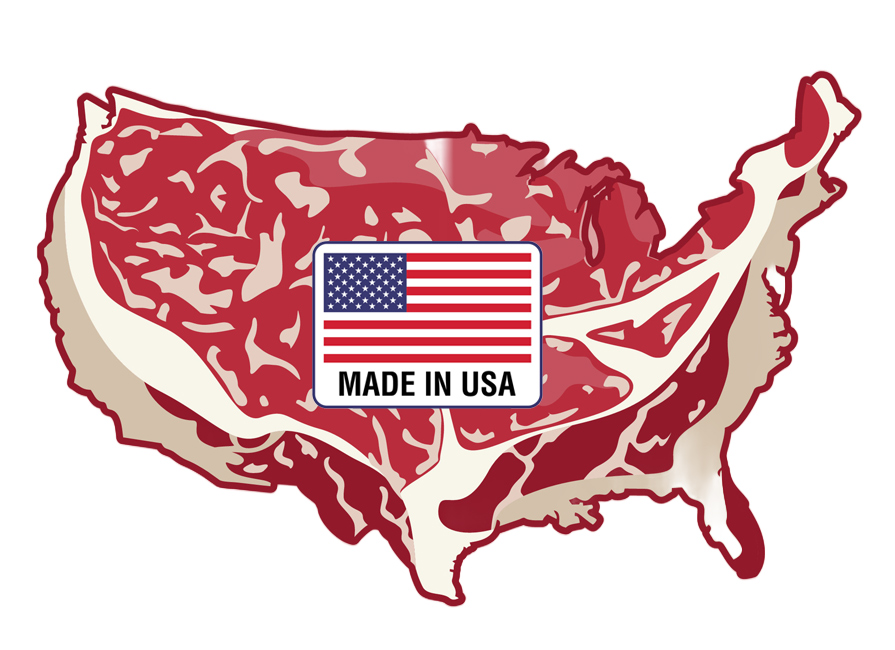In today's increasingly food-conscious world, consumers expect a label to mean what it says—including the…
Antibiotic-Resistant Bacteria: Big Ag Washes Its Hands of Any Responsibility
We can be pretty certain that in the coming days we will hear this message over and over again “So what if most of the meat on our supermarket shelves is contaminated with antibiotic-resistant bacteria? If you handle and cook your meat properly then a few bacteria shouldn’t be a problem; and if you get sick with an untreatable disease then it’s your own fault.’
This is the kind of contemptible retort we can expect from the intensive meat industry lobby and its many trolls in response to new research by the Environmental Working Group (EWG), which reveals high levels of life-threatening antibiotic-resistant bacteria on raw supermarket meat. Yet the “cook it properly and everything will be OK” spin is just Big Ag’s latest attempt to absolve itself of any responsibility for squandering one of the most important medical innovations of our time– and putting American lives at risk.
The EWG analyzed data from the government’s National Antimicrobial Resistance Monitoring System (NARMS), which was established to routinely test raw supermarket meat for antibiotic-resistant bacteria as a way of informing public health regulatory policy on the use of drugs in food-producing animals. Using the latest NARMS data, the EWG researchers detected antibiotic-resistant bacteria in a staggering 81% of ground turkey; 69% of pork chops; 55% of ground beef; and 39% of chicken breast, wings or thighs samples tested. The EWG’s researchers also found “significant amounts” of antibiotic-resistant strains of Salmonella and Campylobacter, which together cause over 3.6 million cases of food poisoning a year. In addition, the researchers found that 53% of the raw chicken samples were contaminated with antibiotic-resistant strains of E. coli, some of which can cause severe diarrhea, urinary tract infections and pneumonia – and even death.
I’ve written before that scientists from around the world now emphatically link the misuse of antibiotics in intensive livestock farming as one of the key causes for the dramatic rise in life-threatening antibiotic-resistant bacteria over recent years. Today, a staggering 80% of all the antibiotics produced in the U.S. are used on food-producing animals. In fact, we use more antibiotics per pound of meat produced than any other nation in the world. Virtually all intensively farmed animals in the U.S. receive regular sub-therapeutic levels of antibiotics in their feed and water to maximize production of meat, milk or eggs by improving feed efficiency or by suppressing diseases that would otherwise spread like wildfire in the confined, dirty, and stressful conditions of intensive livestock operations. The problem for humans is that by allowing intensive livestock farms to routinely expose bacteria to sub-therapeutic levels of antibiotics, we are actually providing the perfect conditions for some very dangerous bacteria to mutate and become resistant to their effects. This means that when we get infected with these antibiotic-resistant diseases, there are fewer and fewer options for treatment. For some particularly nasty disease, we are fast running out of options altogether.
But if people handled meat properly and cooked it thoroughly, says the industry, it doesn’t matter if there a few pathogens in it. So what if they’re antibiotic-resistant? It goes without saying that food poisoning is nothing new: Anyone who has had even mild food poisoning will know that it’s not exactly a pleasant experience. I am the first to acknowledge that good food hygiene is important when handling raw meat – at home and in the hospitality industry. But accidents inevitably happen. The difference is that, in the not too distant past, if you did accidentally get seriously sick with a nasty food poisoning bug such as Salmonella you could generally rely on a quick course of antibiotics to make you better. Today, however, it’s becoming increasingly likely that a bout of severe food poisoning may lead to serious illness, complications or even death as a result of a bacterial infection that’s become resistant to not just one but often multiple antibiotics.
Of course, Big Ag knows only too well that handling and eating contaminated food isn’t the only way that we can get sick from antibiotic-resistant bacteria. It’s widely accepted that these antibiotic-resistant bacteria spread easily from animal to animal in the closely confined conditions of our factory farms, and then from farm to farm. And new research from Denmark has now confirmed beyond reasonable doubt that some strains of the dangerous antibiotic-resistant bacteria MRSA (Methicillin-Resistant Staphylococcus aureus) can be transmitted from farm animals to people, such as farm workers and meat processing operatives, and eventually into the wider community.
But it doesn’t end there. Bacteria are ubiquitous: they are everywhere in our living environment. Scientists have known for some time that bacteria can easily share genetic information – it’s one of the reasons that they can mutate so rapidly. So even if bacteria have not been directly exposed to certain antibiotics themselves, they can pick up genetic information from other bacteria in the wider environment that are resistant. So when factory farms spread the millions of gallons of putrid toxic feces held in their open-air lagoons on to the land around their operations, and it leaches into the soils and water networks, the antibiotic-resistant bacteria in the feces can pass on their resistance to other bacteria species in the wider environment.
This is why the “cook it properly and everything will be OK” advice from Big Ag just doesn’t cut it. Even if we were all to adopt the most stringent hygiene practices found in today’s hospitals– a completely unrealistic, unpalatable and wholly unacceptable scenario – the threat of antibiotic-resistant bacteria to the human population will still exist. But Big Ag is already fully aware of this fact: Remember when the tobacco lobby fought tooth and nail to protect its market, despite overwhelming evidence that they were in fact killing their customers?
In 2011, food giant Cargill voluntarily recalled 36 million pounds of fresh and frozen ground turkey. This was one of the largest Class I recalls of tainted meat in U.S. history, following an outbreak of antibiotic-resistant salmonella food poisoning. The outbreak left one person dead and sickened at least 136 people across 31 states. “It is regrettable that people may have become ill from eating one of our ground turkey products and, for anyone who did, we are truly sorry,” Cargill said in a chillingly-worded public statement. “We go to great lengths to ensure the food we produce is safe and we fully understand that people expect to be able to consume safe food, each serving, every time.” Yet Cargill then appeared to abdicate any responsibility whatsoever and placed the blame of the outbreak well and truly on the shoulders of the public: “We all need to remember bacteria is everywhere, and we must properly handle and prepare fresh foods wherever they are served.” The message? It’s now our fault when the antibiotics don’t work. We say don’t blame us when your system breeds mutant bacteria and you cannot control them!
Safe handling instructions for food should exist to protect consumers from the risk of catching treatable food poisoning bugs. It should NOT be seen as an excuse for the intensive meat industry to continue to misuse these vital medicines in a way which is actively encouraging antibiotic-resistance, nor as a means of absolving itself of all responsibility for any illnesses or deaths that result. It’s exactly the same kind of asinine mentality that thinks it’s OK for industrial farms to continue to pollute our waterways with fecal waste, pharmaceuticals and agrochemicals: “Our drinking water is treated to ensure it’s safe for consumption, so where’s the problem?”
No one wants food poisoning and every individual should take care over how they handle and cook meat. But we all know that accidents will inevitably happen. The big question is: does anyone really think it’s acceptable that an accidental spill in the refrigerator or a mistake in the restaurant kitchen could now result in a potentially untreatable – but entirely preventable – life-threatening antibiotic-resistant disease? Is cheap meat really worth it?



